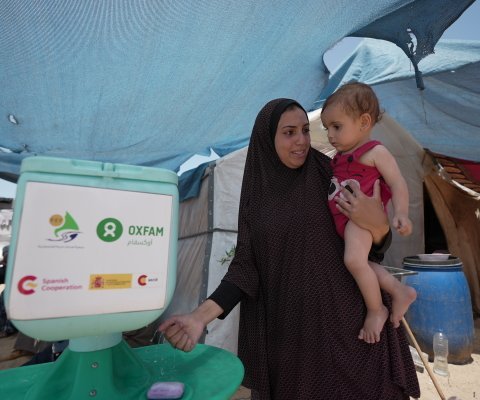Nearly 90% of the country faces severe water shortages leaving 3.5 million people in extreme hunger.
Nearly 90% of Somalia is now in a severe drought, following three consecutive failed rainy seasons. Some areas are facing their driest season in 40 years. Nearly 3.5 million people are already acutely food insecure and millions more are now at risk of going hungry by the beginning of next year. With no respite in sight, pastoralists’ chance for planting next season’s crops or finding grazing land for livestock is vanishing.
“People in Jubaland in the South, Gedo, Mudug, Nuugal, Bari, Toghdheer and Sool have been the hardest hit. Some have already experienced intense drought for more than a year and have had to watch their livestock, crops, and savings perish in front of their eyes. They urgently need lifesaving water, food and cash,” said Amjad Ali, Oxfam Country Director in Somalia.
Many farmers and pastoralists have told Oxfam harrowing stories of how the drought has devastated their lives.
Maryan Abdulaahi, a woman farmer living at the outskirt of Dudumaale village said: “We did not receive rain for two seasons. Our livestock and own lives are in danger. In Dudumaale we use to fetch water from berkeds [traditional Somali water cisterns], but all berkeds are empty right now. The drum of water costs $4 which we cannot afford.“
Most natural water sources have dried up, pushing up the price of potable water. The price of a 200-liter water drum jumped above the five-year average by 45% in Gaalkacyo, Mudug Region, 70% in Jilib, Middle at Juba Region, and 172% in Garowe, Nugaal Region, last October.
Persistent climate-fueled drought, compounded by ongoing conflict, locusts and COVID-19, has fueled hunger in Somalia and will leave 7.7 million people - nearly half the population - in urgent need of humanitarian assistance by 2022. This is a 30% rise since 2021. Somalia already ranks highest in the world Global Hunger Index with over half its population suffering from extremely alarming levels of hunger and malnutrition.
Khadra Yusuf Saleban, 48-year-old displaced woman from Bali-docol camp said: “I have many fears about [having no] water and food for my children and my parents. Our livestock is the backbone of our life. I lost it all in the last drought. Without water and food there will be death to our livestock and to our families, particularly children and elderly.”
Oxfam and partners have already reached nearly 185,000 of the most vulnerable people across the country, with clean water and sanitation, food, and rehabilitation programs.
Aydrus Daar, Executive Director of WASDA, one of the local organizations Oxfam partners with, said: “I have been involved in droughts since 1991 and I have never seen a drought that has impacted people as badly as has this one. Many pastoralists have lost 100% of their livestock. This has never occurred in living history. Our biggest concern is an imminent famine.”
“In the 2011 drought crisis an estimated 50,000–100,000 people lost their lives. Despite the warnings, the international humanitarian system did too little too late. We must make sure that history does not repeat itself. We must act now. More than a third of the humanitarian appeal for Somalia this year is unfunded,” said Amjad Ali, Country Director of Oxfam in Somalia.
To help prevent a worsening catastrophe, Oxfam and partners aim to double the number of people reached, providing the most vulnerable in South Central Somalia, Somaliland, and Puntland with lifesaving water, food, and cash in the next six months. Oxfam also aims to help communities rebuild their lives and adapt to the cyclical expected climate disasters.
Oxfam urgently needs $15 million to help boost its humanitarian response in Somalia and save lives.
Notes to the editor
- More than 2.8 million people in 66 of the country’s 74 districts (which is 89% of the country) have been affected by severe drought; nearly 133,000 displaced in search of food, water and pasture. Source: UNOCHA Somalia Drought Snapshot as of December 2, 2021
- According to CHIRPS remote-sensing data, rainfall totals rank among the driest on the 40-year record in Lower and Middle Juba, Gedo, Mudug, Nugaal, and southern Bari regions
- 3.4 million people are estimated to be in IPC3 or above by December 2021. 3.7 million are in stressed livelihoods and face high risk of going hungry. Source:Somalia: Acute Food Insecurity Situation July - September 2021 and Projection for October - December 2021
- Somalia tops the Global Hunger Index in 2021 with 50.8 points, a 12.6% drop since 2020.
- FEWSNET: Somalia Food Security Outlook September 2021
- The $1.09bn worth Humanitarian Appeal for Somalia has only been funded by 71% according to UNOCHA 2021 records. The appeal is likely to increase to $1.5bn in 2022.
- Somalia tops the Global Hunger Index in 2021 with 50.8, a 12.6% drop since 2020.
- Somalia Humanitarian Overview: https://gho.unocha.org/somalia
- Oxfam’s report (2012) A Dangerous Delay: The cost of late response to early warnings in the 2011 drought in the Horn of Africa outlines the number of people who were facing catastrophic levels of food security – or famine like conditions. IPC5.


